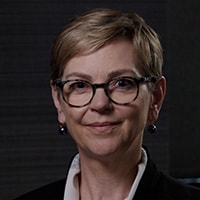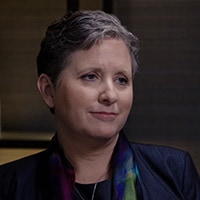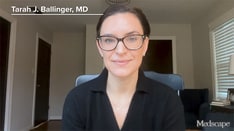Transcript
This transcript has been edited for clarity.
Jennifer J. Griggs, MD, MPH: Hello. I'm Dr Jennifer Griggs, and joining me for today's Care Cues conversation is Dr Kate Rosenblum, a professor of psychology in the Department of Psychiatry at the University of Michigan. Kate also was recently diagnosed with and treated for breast cancer. Welcome, Kate.
Katherine L. Rosenblum, PhD: Thank you, Jennifer. It's a pleasure to be here.
Griggs: The focus of our conversation today is patient-clinician communication around breast cancer diagnosis and its treatment. Tell us a little bit about how you were diagnosed and about any communication that you recall around that time.
Rosenblum: Sure. I was diagnosed almost 2 years ago. I'd found a lump myself and I was concerned about it. I was already on more frequent monitoring. When I went in for that mammogram, I definitely noticed that people were responding differently, and they told me that the nurse would stay just to be there with me.
An area that they'd been monitoring was associated with the lump that I felt, and [the doctor] sort of spelled that out and then said, "We're thinking cancer." I said to him, "Well, you haven't done the biopsy, so it could be something else, right?" And he was sort of quiet and said, "Mm-hmm. Yeah, it might be something else." But I then went on to have a biopsy and it was triple-negative breast cancer.
Griggs: It sounds like the bottom sort of fell out as you heard the words and those nonverbals that you were getting without anybody being direct. You were picking up indirectly on what was going on.
Rosenblum: It was really hard to remember all the things that they were saying. I really wish that my partner had been there with me. This was during COVID times, so it wasn't possible for her to be with me in the waiting room. But in hindsight, I think it would have been really nice if they had asked me, "Is there anyone who you want to call?"
Griggs: There are quite a few important things in what you've just shared with us. And clinicians like me, we always want to do better. So if you could say something to our viewers, what might it be, around the diagnosis in particular?
Rosenblum: It was really helpful that the feedback was given to me in a really clear, straightforward way. And it was really important to me that it was honest. I didn't feel like they kept their concern from me. At the same time, they were focused on "so here's what we're going to do." And that gave me a sense of purpose and sort of the ability to focus on the next step.
Griggs: Are there other things that were said to you or other interactions that you had that you remember as particularly positive?
Rosenblum: What really stood out to me was how clear [my oncologist] was that there was a plan and that they were going to be able to help me. She even conveyed a sense of empathy and concern that I had the diagnosis but also excitement that there was a new clinical trial. The FDA had just approved a new treatment protocol, and I was one of the first patients who would be going through this new protocol. And that felt really good, because I felt like certainly she understood the gravity but also the sense of "we can help you with this."
Griggs: She balanced the seriousness and didn't try to brush that off or falsely reassure you. She balanced that with optimism and hope, and in your case, it was very helpful to have a plan.
Rosenblum: Yeah. And I am someone who really likes information. So that really spoke to me. I'm curious: How do you balance holding space for the challenging feelings that people are navigating with holding hope for the patients that you see?
Griggs: It's something we think about a lot. How do we be honest and forthright? And we have a lot of information to give. In breast cancer, there's tumor size and nodal status and estrogen and progesterone receptor status and HER2 status, grade. That's even before we get to treatment. So we have to tailor the degree of information we give to a given person and their learning style, and then convey hope. And hope is beyond facts and figures.
The most gratifying thing I do when I form what we call a therapeutic alliance with a patient is learning about their learning style. So if I had asked you: Kate, what kind of person are you? Are you "I want to know everything" or are you a "just what I need to know" person? You would have said, "I love information," and that would have shaped how much information I gave you, the pace at which I gave it to you. I might have had you record our conversation.
And for another person, maybe at the other end who's a "just what I need to know," I would have jumped more to the plan. I usually say, "What of that made sense to you?" so that they have an invitation to say, "None of it made sense" or "I think I'm keeping up." Because assessing comprehension is so important too. You mentioned that your partner wasn't with you, either by phone or in person, when you got the diagnosis. Was your partner able to join you during your oncology visit?
Rosenblum: Every time. And that was so important to me. My partner also is a breast cancer survivor; 10 years prior she had also gone through triple-negative breast cancer treatment. I knew what it was like, to some extent, being on the other side, if you will.
Something I really appreciated was that she was always made to feel welcome. My oncologist absolutely always included her in the conversations, as did all of my providers. I feel very lucky about that. And it certainly made a difference for me. Even if it's not a partner, could it be a friend? Is that something that you think about when you're meeting with people?
Griggs: I do, yes. I always ask that people find somebody in their life who can be there, somebody whom they trust, and then I tell the patients to tell that person what they need from them. "I need you to take notes." "I need you to ask that question I'm afraid to ask." So, I understand that you had some familiarity with triple-negative breast cancer and how that shaped how you went about making decisions for yourself.
Rosenblum: One clear-cut decision that I had to make was about my surgery, and this was something I agonized about. I knew that from a survival standpoint, all of the research data suggested that lumpectomy and mastectomy have the same long-term outcomes. And I'd had providers share with me that it was really up to me. I knew that what I really wanted was a mastectomy because I'd had so many years of biopsying and surveillance.
I said to the doctor, "I just really need to ask you: Given what you know about imaging and my breasts, what should I do?" Her first answer was, "It's up to you. There are no long-term survival differences." And then at some point she said to me, "I think what you're asking me is, if it were me, what would I do?" And I said, "Yes, that's exactly what I'm asking you."
She looked at me and said, "You know, your breasts are really noisy. And I think if it were me, they'd be out of here." Now, maybe that was the right thing to say or maybe not. But I will share with you that I found it immensely reassuring. It was so helpful to me that she said this thing that gave me permission to do what I wanted to do.
Griggs: I love the story and I love that you said you kind of knew what you wanted to do in your gut. You also mentioned a couple of times that survival is equivalent, but it's about more than that.
Rosenblum: Good point.
Griggs: It's about that surveillance period. It's about life after treatment: What is going to be facing me going forward? And you mentioned that you had a few biopsies. In general, we try not to say what we would do if it were us, because we've not been in that situation. If we have, it's still not our story.
What I often will say is, "In my experience, a lot of people with the type of history you've had will lean toward getting a mastectomy." But we do try not to say "this is what I would do" because then it's anchoring that decision for the patient so that if she makes a different decision, is she somehow violating a recommendation? It's a tricky thing.
Rosenblum: When I was going through radiation treatment, I would sit every day for 6 weeks in a room with other women who had traveled sometimes for hours. And not infrequently, the conversation would be about the time spent traveling and the cost of traveling. One of the things that I learned was that some of these women had been receiving money from the hospital to pay for gas. So I'm curious: How do you talk with patients about that?
Griggs: There's so much stigma attached to financial hardship that people don't want to ask. But I think the key is to ask and to find ways to ask in a way that isn't stigmatizing. One of the things that we can do is normalize that a lot of people face different types of barriers to receiving care, and then we give a few examples. Are you facing any of those?
Rosenblum: When I think about the barriers that I have faced, I think maybe one of the biggest is internal, that I am someone who sometimes finds it hard to reach out and ask the question or ask for help. I might spend too much time worrying about being a good patient, not being burdensome.
Griggs: We see that so often. And in fact, in an encounter with a new patient, a patient's ability to speak up for herself gives us more confidence that she'll be able to tolerate treatment. We see people dressing up for physician appointments so that they look like they're worthy of the dignity that they have.
The way I work with my patients around this is by saying, "I can't give you the good care that makes my life so rich and fulfilling if you don't give me the input. I need to know: Where are we going wrong? What makes no sense to you? What questions do you have, even if it's trivial? If we can reassure you with a quick portal message, we just took care of something so easily and soothed your worries or concerns." I don't know if that makes sense.
Rosenblum: It does. And you added a whole dimension in thinking about how it has downstream positive effects.
Griggs: You mentioned that it's been 3 months between your previous appointment and yesterday's appointment. I'm wondering what that's been like for you.
Rosenblum: Well, after 20-some months of active treatment and surgeries, that end-of-treatment was a major adjustment. You're not meeting with your providers so regularly and it's a whole different life. I think most people don't understand that. So when your provider does, it is really reassuring.
Griggs: I definitely do what your oncologist did and anticipate those feelings that might be coming and that loss of support and scaffolding. Everybody around you wants so badly for things to be back to "normal." And that discordance between how everybody expects you to feel and how you feel is something I talk about a lot.
Rosenblum: Yeah. I appreciate that the support group that I was attending during treatment was really a group for people who were in active treatment. The one that I joined toward the end is called Bonded By Breast Cancer, and it's an after-treatment focus. We all share these kinds of feelings.
Griggs: It's about your story.
Rosenblum: Absolutely.
Griggs: This has been such a rich and important conversation. Thank you so much for joining me today on Care Cues.
Rosenblum: The pleasure has been mine. Thanks so much.
Medscape © 2023 WebMD, LLC
Any views expressed above are the author's own and do not necessarily reflect the views of WebMD or Medscape.
Cite this: Communication Strategies in Breast Cancer (TNBC) - Medscape - Nov 15, 2023.










Comments